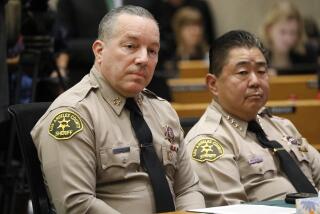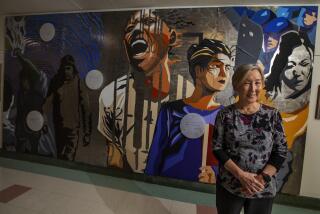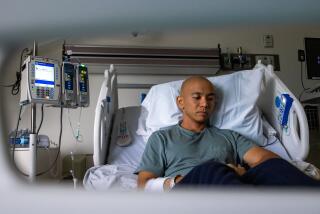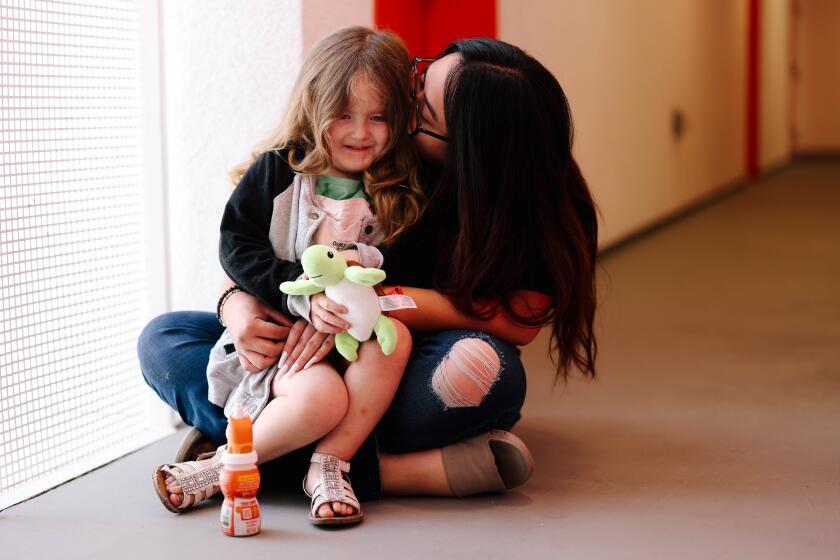After livers, cash to UCLA
A powerful Japanese gang boss who received a liver transplant at UCLA Medical Center donated $100,000 to the Westwood hospital shortly after the surgery, The Times has learned.
A plaque dated November 2001 at the entryway to a seventh-floor surgery office reads, “In grateful recognition of the Goto Research Fund established through the generosity of Mr. Tadamasa Goto.”
UCLA confirmed the amount of the donation Friday. Law enforcement sources say Goto, 65, is the leader of the ruthless Goto-gumi gang. He received a transplant at UCLA in July 2001, The Times reported Thursday. He made his donation less than three months later.
UCLA also acknowledged that it received a separate $100,000 donation from another man who figured in Thursday’s story. He donated in 2002, the year of his transplant.
The man was identified by a law enforcement official as one of four Japanese men now barred from entering the United States because of their suspected gang affiliations, criminal records, or both. All four received new livers at UCLA between 2000 and 2004, The Times reported.
The Times is not naming the second donor because it has not been able to reach him or his lawyer about the law enforcement assertion. Japanese police do not generally make public information about gang affiliations.
UCLA spokeswoman Dale Tate said the university had “no reason to question” the source of the money given by Goto or the other donor. Both donations were deposited into the Department of Surgery’s Discretionary Fund, she said. When asked if the money had any bearing on the men’s transplants, Tate said: “Absolutely not.”
In a written statement, Tate said the surgery discretionary fund was used to support research and education for the liver transplant program.
UCLA’s actions drew attention Friday from a leading U.S. senator and mixed reaction from doctors and transplant professionals.
The surgeries took place at a time of persistent shortages of donor livers. In the year of Goto’s transplant, 186 patients on the list for livers died while waiting for the operation in the greater Los Angeles region.
U.S. transplant rules allow hospitals to provide organs to patients with criminal histories and to a limited number of foreign patients, but both topics have been controversial. News that UCLA had provided livers to foreigners barred from the country generated considerable comment Friday.
Sen. Charles Grassley (R-Iowa), who has considerable influence on federal health policy and an interest in transplant oversight going back several years, said he was “worried about the credibility of the transplant system” and would demand additional information from the university.
If the transplant system “doesn’t have credibility, we’re not going to have people donate organs,” said Grassley, the senior Republican on the Senate Finance Committee, which oversees federal hospital funds. “I think I have to get to the bottom of things.”
Some said they worried the surgeries would discourage people from donating organs; others said that there are so few transplants going to either foreigners or criminals that it should have no effect.
All four of the transplants were performed by Dr. Ronald W. Busuttil, executive chairman of UCLA’s surgery department, according to a person familiar with the cases. Goto’s lawyer, Yoshiyuki Maki, previously confirmed that his client received a transplant at UCLA and that Busuttil subsequently examined Goto in Japan. Neither Maki nor Goto could be reached for further comment Friday.
Goto had been prohibited from entering this country before his transplant, but the FBI agreed to help him get a visa in exchange for information on potentially illegal activities in the United States by Japanese gangs, commonly known as yakuza, a former FBI official said. Goto provided little information of use, he said.
There is no evidence that UCLA or Busuttil knew at the time of the surgeries that any of the patients had a criminal record or ties to the yakuza. Both said in statements earlier this week that they do not make moral judgments about patients and treat them based on their medical need.
Busuttil, a world-renowned surgeon and co-editor of a leading text on liver transplantation, said in his statement that he considers it “part of my responsibility and obligation as a physician” to ensure that his patients receive proper care whether in the U.S. or abroad.
Busuttil declined to comment Friday through his attorney, citing federal patient-privacy laws.
It is not uncommon for transplant recipients or other grateful patients to donate money to hospitals after receiving life-saving medical care. Businessman Robert A. Day and his wife Kelly, for instance, donated $30 million last year to the UCLA Department of Surgery to express their gratitude for his liver transplant two years earlier.
Even so, Arthur Caplan, a bioethicist at the University of Pennsylvania, said hospitals have a responsibility to inquire about the source of their gifts.
“It starts to defy credulity that you’re not going to be curious about who these people are, if only to ask them for more money down the road,” he said. “Any development officer who didn’t follow up a $100,000 gift with a check of who this guy is and who his friends are would be an ex-development officer.”
Wealthy foreigners, he added, are attractive to transplant programs because not only do they pay the full cost for their procedures, but they often make gifts of gratitude later.
Dr. Joseph Tector, chief of transplant at the Clarian Transplant Institute at Indiana University, defended UCLA’s actions. The occupations of his patients are not relevant, he said.
“As doctors, you are not a member of the clergy to ascertain someone’s worthiness,” he said. “You don’t want to discriminate. These calls don’t come so much into questions with other procedures. But with livers, the water is muddied because not everyone can get transplants. There aren’t enough livers. “
But Dr. David Mulligan, a liver transplant surgeon at the Mayo Clinic in Phoenix, took issue with UCLA’s statement that it does not make moral decisions when it adds patients to its transplant waiting list. He said transplant professionals make such decisions every day.
“By saying that we don’t impose any kind of a moral judgment on people is not entirely complete,” he said, “because I think that every transplant center has members of the [selection] committee who are social workers and financial aid advisors and psychiatrists who are intensely involved in the estimation of every potential recipient and their ability to progress with a full and long-standing recovery.”
“I don’t think that transplant centers can turn a blind eye to patients’ social histories and their backgrounds,” he said, adding that his center has run criminal background checks on some American patients about whom it has questions.
Transplant rules give hospitals and doctors the final say on which patients get added to their waiting lists, and they have the discretion to refuse patients with unhealthy lifestyles that could compromise the transplant’s success. Patients may be refused on other grounds as well, including an inability to pay.
One L.A. doctor said he believes that UCLA’s reputation as a first-class transplant center will suffer from the news of the four transplants.
“It’s going to have a real negative effect,” said Dr. David Boska, an internist in Brentwood who says he has referred 10 patients to UCLA over the last decade. “Their interest is to make sure people know they have a first-rate program. This isn’t going to help.”
Boska, who said he is a friend of Busuttil, added: “I have lost faith in the system, not the program,” he said.
“You have a brother who dies because he doesn’t have $500,000 to spend on a liver. That’s a terrible thing to think about. Then you learn that we have foreign criminals who come in and get livers. That’s not good.
“But it’s terrible thing that we don’t have any guidelines. We should have them. We have all these people dying in Los Angeles.”
--
--
john.glionna@latimes.com
More to Read
Start your day right
Sign up for Essential California for news, features and recommendations from the L.A. Times and beyond in your inbox six days a week.
You may occasionally receive promotional content from the Los Angeles Times.







